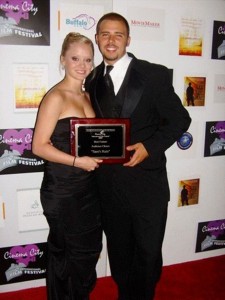By Sandy Hill/reporter

NE Campus student Hunter LeMoine, 19, grew up watching the Oscars, fell in love with film and dreamed of telling interesting stories and producing movies some day.
That day came in 2008, when he and John Hays, his best friend since eighth grade, wrote a script and found the financial backing to turn it into a full-length movie titled Sam’s Rain, a story about a soldier returning from Iraq.
“I was compelled by all the great cinematic adventures people go on,” LeMoine said. “I just decided to type things out and see how it evolved.”
After watching the news one night, LeMoine and Hays felt the need to write a story about soldiers and the difficulties they face transitioning back into life after war. The two were both 17 at the time.
“It’s like 9/11. It hits people in the face and then goes away,” LeMoine said. “We forget about it very quickly.”
To write the script, Le-Moine interviewed about 40 soldiers to get their input

on life after war.
“I didn’t want to make a war film, and I didn’t want to make a political film,” he said. “I just wanted to make a film about a guy, just a guy, and how he comes back to America.”
The script took about a year to complete. Then, both young men asked their fathers for $15,000 to make the movie.
Bruce LeMoine, Hunter’s father, recalled jokingly patting his pants and telling Hunter he must have left the money in his other pants pocket.
Bruce LeMoine believed that whether or not he could support his son financially was irrelevant.
“Just because you can do something doesn’t mean you should,” he said. “You don’t really put a lot of thought and credibility into the idea that he’s really going to do that.”
Both fathers were supportive of the venture but decided not to give the boys the money. LeMoine and Hays moved forward despite the setback.
“He took it and said, ‘Fine, I’ll do it on my own,’” Bruce LeMoine said. “It showed me his character, initiative and motivation.”
Susie LeMoine said they have always tried to tell their son he could do anything he wanted to do. Although they were skeptical at first, they gave both boys their full support, wanting only the best for them.
“Did you ever think that your son could borrow money and make something like that?” she said. “It was amazing to us that he could take that load on and do that.”
LeMoine and Hays put an ad on Craig’s List looking for a financial backer for the movie.
Local businessman Craig Curry of Sea to Sea Records in Garland answered the ad.
After meeting at a restaurant to look over the script, Curry agreed to fund the film. Curry, also a former Marine, said he found the script interesting.
“Here, you’ve got Hunter, this free-spirited, high-energy dude,” he said. “Then, you’ve got John, this conservative, calm, cool, collected guy. They made a good combination.”
With the help of their parents, the boys got a lawyer, had a contract written up and created Tip Top Productions, the company that produced the movie.
In July 2008, LeMoine and Hays rented a camera for $1,000 a day and spent the next three to four weeks shooting the script.
About halfway through filming, the young men realized they needed more help. They hired an assistant director, a director of photography and a grip to help with the additional demands of filming.
One thing LeMoine learned about filmmaking is that nothing ever goes as planned. Filmmakers have to overshoot for everything, he said.
“One page is equal to one hour of shooting on a script typically,” LeMoine said. “If you’re looking at shooting nine pages a day, you’re looking at a very long day.”
The movie opens with a helicopter scene he didn’t want to be computer-generated. Le-Moine asked his father, an Army reserve helicopter pilot, if he could get in touch with a buddy who had a helicopter.
The group trucked down to Midland and shot the scene with Hunter lying on the tarmac while his dad flew the helicopter above him.
Bruce LeMoine asked his son, “How close do you want me to get?”
Hunter LeMoine responded, “Come as close as you can.”
When asked how close he came, Bruce LeMoine chuckled and said, “Well, I didn’t hit him. People [at the film festivals] thought computer graphics were used on the helicopter scene, not realizing they were live shots.”
LeMoine, who is not very confident with his own acting, has a small part in the movie but prefers to stay behind the camera.
“I like telling the story,” he said. “But I’d much rather get a great actor to tell my story for me.”
LeMoine’s favorite part of the whole process was the on-set production.
“Editing is fun too. It’s just so tedious,” he said. “That’s where the magic can happen. That’s where you can make or break a film.”
After the filming was completed, LeMoine made two trailers. By this point, summer was over, and Hays had left to attend Pepperdine University in California.
Left to finish the movie on his own, the stress began to mount. LeMoine sat in front of the computer editing for 10 hours a day. He decided at that point to have the film professionally edited. The process took about six months.
The original plan for the movie was to go straight to DVD. But Curry, executive producer of the film, said he would ultimately like to see it released in theaters.
“It’s a very difficult goal to accomplish,” Curry said. “The studios are very competitive.”
Curry is thrilled to be a part of the film and takes pride in what LeMoine and Hays have done, considering their limited amount of experience.
“I had never actually been involved in a production on the director/producer side,” Curry said. “It’s a darn good low-budget movie.”
In November 2008, Le-Moine, Hays and Curry headed to Santa Monica, Calif., to attend the American Film Market, a weeklong distribution symposium. They met with producers and showed the movie trailers.
While there, Susie Le-Moine said people questioned her young son asking how he obtained the preview and how he was included in the symposium.
“They didn’t understand that he had done it,” she said. “They were dumbfounded and couldn’t believe he was 18 years old. He was even offered a job while he was out there.”
While in California, Le-Moine received some sound advice from Scott Jones, president of Artist View Entertainment.
“You’ve got something good here,” he said. “Don’t just bite at the first fish that comes along.”
In September, LeMoine and the three other main actors from the film attended the Cinema City International Film Festival in Los Angeles, where they won the award for Best Picture.
At the Downbeach Film Festival in Atlantic City, N.J., in October 2009, they were honored with the Best New Producers Award. And at the Accolade Competition in San Diego, Calif., in October, they received an Award of Merit for Best Screenplay. Three of the four were nominated for best actors along with multiple other awards at the same competition.
LeMoine’s hopes for the movie now are foreign and domestic distribution. A major distributor is currently looking at the film, and the production company has buyers from several markets interested in distributing the film on DVD.
“I’m not going to be disappointed if we go straight to DVD,” Curry said. “There are a lot of people that don’t even make that.”
Learning from experience has been difficult, yet valuable for LeMoine, who said he will never do another film without having a secure distribution deal.
“If you go in with cold feet, nobody knowing about you, no talk about the film and you have nobody interested and no name in the film, you’re working from the bottom up,” he said. “What not to do is the biggest thing I learned.”
After the spring semester, LeMoine plans to finish out his radio, television and film degree with an emphasis in cinematography and screenwriting at the University of Texas at Arlington.
LeMoine said he has already started directing his next film, which is a story about the power of forgiveness and loss.
The story was written by his girlfriend and NE student Katelynn Meeks, who plays Nikki in Sam’s Rain.
Susie LeMoine said this experience has been good for her son.
“He loves California,” she said. “That’s where he wants to be. I know one day he’ll probably end up in California doing what he wants to do. I guess that’s what we want for our kids, right?”
As for LeMoine, he is looking forward to his future career prospects in the movie-making industry.
“Hopefully, I can make some money, then move out to California and start an industry name,” he said.






















